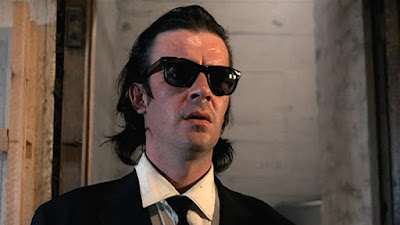As “Ariel” begins, Taisto (Turo Pajala) is put out of work when his mine in the far north of Finland closes. Seeking council in a café, Taisto’s father hands over the keys to his 1962 white Cadillac convertible, councils his son to leave town and get further south, that staying put will leave him drunk or depressed, or both, hands over the keys to his car, goes into the bathroom and blows his brains out. It is difficult to explain without the scene’s accompanying tone just how funny this is, so long as you’re into bleak humor, which, I confess, I whole-heartedly am. It’s evocative of a movie in which the characters speak little yet when they do, tend to say exactly what they mean, no fuss, no muss, and pitched between a line of all-out surrender and taking extreme action, evocative of a world so downtrodden there isn’t much middle ground left between the two. Taisto simply lights another cigarette after his dad’s demise, then packs up what he little he owns, withdraws all his money from the bank, and drives his new car away, the wooden shed where it’s been kept crumbling in the background he does, barely one step ahead of a fallen world.
In this, the second of writer/director Aki Kaurismäki’s so-called Proletariat Trilogy (see: previous Friday Old Fashioned), there are echoes of The Coen Brothers, the formerly united Ethan and Joel who were getting their start around the same time, and whose movies are often akin to elaborate torture devices for their main characters, comic theaters of cruelty, to borrow a phrase by the critic J. Hoberman. Indeed, as Taisto hurries south, he is beaten and robbed of all his money, loses a dock-working job to make that money back, and winds up in prison after he roughs up the very same thief who robbed him. That all sounds like a comic maze of cruelty, too. Yet, in his tall, wiry physique and long black hair, Taisto never comes across like a mere punching bag, cutting the image of an off-kilter movie star, like if Hollywood had known how to utilize 1990s Kevin Corrigan, and his character, and those he counters, virtually breathe defiance. When he meets cute with a meter maid (Susanna Haavisto), she tosses her meter maid hat to the ground and goes for a joy ride in his convertible. After he sells his convertible for peanuts to an unscrupulous dealer, he eventually goes and steals his car back, manifesting the point where antihero loops around to become hero again.
An early scene when Taisto briefly bunks in a hostel ultimately feels no different from when he’s locked up in his prison cell, underlining how little difference there is in “Ariel” between the world outside and inside the cell. When Taisto and his cellmate (Matti Pellonpää) make an escape, it’s less about breaking out of prison than it is taking the moose by the antlers, though this sense of carpe diem is as ironic as it is earnest, mirrored in deploying “Somewhere Over the Rainbow” as the credits roll, not to mention just about the greatest deadpan payoff I have ever seen in a movie. It involves the convertible, and the top that won’t go up all movie, and when it finally does, the characters watching with the air of people watching explosions in the sky with the air of people watching paint dry, it’s as if shelter from life’s storm is just that close, and yet so far, so very, very far away.




No comments:
Post a Comment